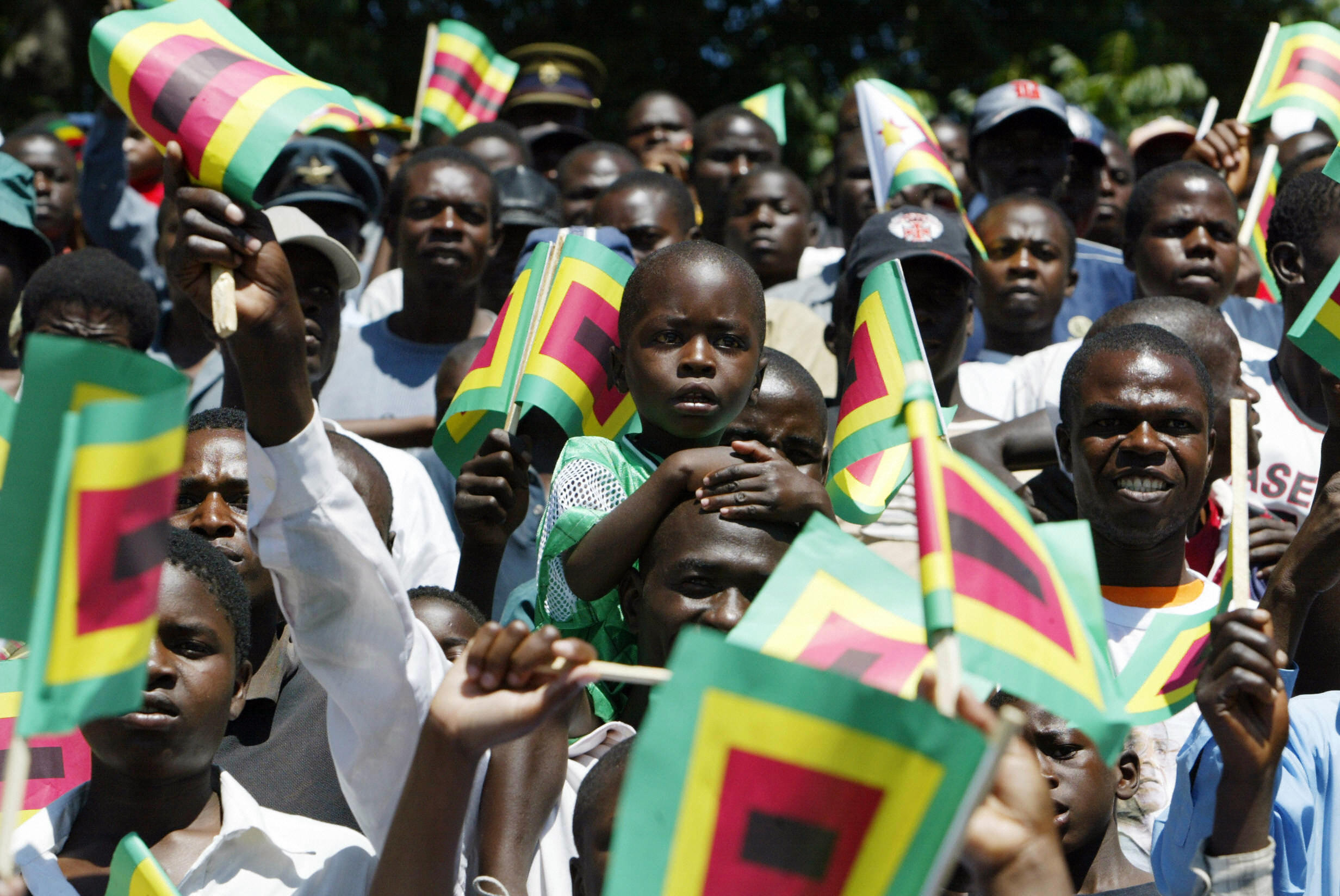
Zimbabwean wave their national flag during a ceremony marking the 28th anniversary of independence from Britain on April 18, 2008 in Harare. Zimbabwe President Robert Mugabe came out fighting during the ceremony in his first major speech since disputed polls, fending off criticism over his rights record and accusing Britain of stirring up unrest. AFP PHOTO/Desmond Kwande (Photo credit should read DESMOND KWANDE/AFP/Getty Images)
We were all happy to see Robert Mugabe dethroned last year. He was, after all, an anti-white tyrant who helped facilitate the decline of the formerly prosperous Rhodesia into the worst third-world hellhole on earth. So a new leadership is certainly welcomed, and even former white Rhodesians are taking the bold step of peacefully returning to their farms under the new Mnangagwa government.
Concerning Mugabe, those on the Right often forget that he was also an enemy of our enemy. Liberal Western nations have sanctioned Zimbabwe for many years now, and since we know from their attitude towards South Africa that they don’t give a damn about white farmers, we have to assume an alternative agenda. Mugabe didn’t fit the role of the puppet regime they dreamed of in Zimbabwe. One can point to numerous possibilities as to why this is – his stance on the homosexuality issue is one I can think of. Perhaps it is because he didn’t positively contribute to making a multicultural Zimbabwe work, which gave us on the right an example to point to as validation for our worldview. There can be many other aspects; I don’t claim to know what is whispered at Bilderberg conferences.
So when Emmerson Mnangagwa took the reins into his hands last year, a new feeling of optimism was, perhaps understandably, felt among all of those involved. I’m no prophet, and Mnangagwa might be a better leader than Mugabe, but what I do know is that he has been a long-time ally of Mugabe who turned against him only when he was fired from his post as vice president. We therefore have no real reason to believe that Mnangagwa is ideologically different from Mugabe. Presuming he isn’t less of a pan-Africanist than Mugabe, why would he now let white farmers start returning to their land? For one thing, he is the new leader of a country with a hungry, desperate, and angry population. Zimbabwe’s economy has always been highly dependent upon agriculture – indeed, with a nearly unprecedented agricultural potential. Zimbabweans want change, and Mnangagwa knows that to avoid another revolution like the one Zimbabwe just had, things have to change.
What we are seeing in the regime change in Zimbabwe is not a new dawn for the country. It is part of the never-ending African cycle of starvation – dependence – revolution – starvation, of which there are numerous examples. Recall Zambia, where whites were massacred and driven out in the past, and yet more than 100 000 whites have re-settled over the past few years.
On the positive side, there are good short-term reasons to go reclaim your farm in Zimbabwe. Like I said, it is an agricultural paradise and one might have a decade or so of very prosperous farming conditions to look forward to before the next step of the cycle starts again, by which time you could have sold your land to the next sucker at a profit. Nonetheless, those who believe in the long-term prosperity of Zimbabwe live under a delusion, just like South Africans who believe that prosperity will emerge with a new black president.
In short, if I had a claim to land in Rhodesia that the previous government stole from me, I would probably also return to Zimbabwe for a short period to work on improving my infrastructure and get an attractive offer for it in a couple of years when the price is right. Actually, buying up cheap land in Zimbabwe now might not be a bad short-term investment. But I would certainly not return to Zimbabwe with any long-term plans. The history of Africa has proven that the white man cannot live with the black man in harmony for an extended period of time when the former is the minority. The end-result of such a demographic (im)balance is always civil war or genocide.
Some Rhodesians might scold me for a lack of optimism by saying their country is forever lost. I understand the sentiment, but in calling ourselves race-realists, we also have to be realistic about the nation’s long-term prospects, which haven’t improved, notwithstanding Mugabe’s departure.
| Tweet |
|
|
|




